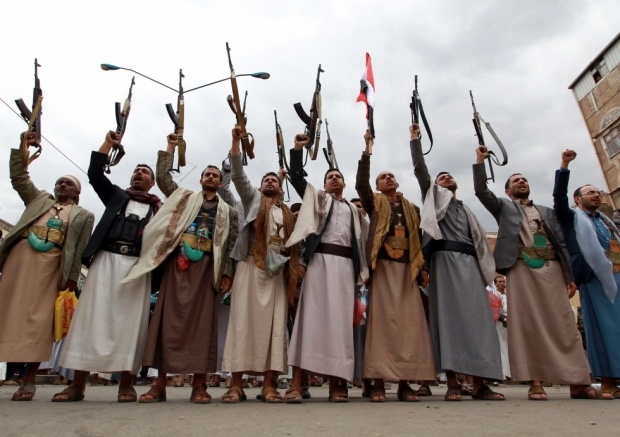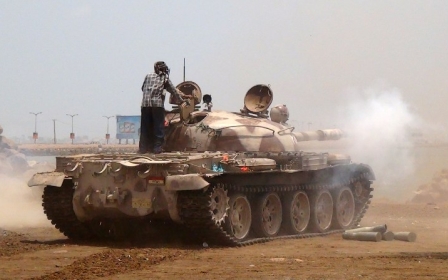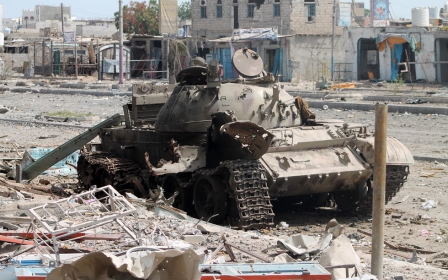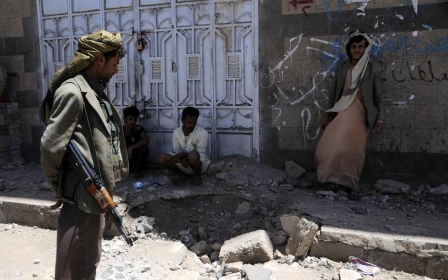Reporters flee Sanaa amid Houthi 'siege on journalism'

SANAA - Since the Houthis took control of the Yemeni capital, Sanaa, on 21 September, they have stormed the offices of many of the media outlets that oppose their policies in a bid to silence their opponents.
They have also arrested more than 25 journalists since the beginning of this year, subsequentally releasing most of them, while three others are still detainees, the secretary of the rights and freedom committee of the journalists syndicate, Ashraf al-Rifi, told Middle East Eye.
Al-Rifi said that journalist Galal al-Sharabi, who works for the Dubai-based MBC channel, photographer Mohammed Aidha from the US-based Alhurra TV channel, and Waheed al-Sofi, the editor-in-chief of the al-Arabiyya news website, are still detained by Houthis, and no one knows their whereabouts.
Al-Rifi said that all the journalists that the Houthis have released were forced to sign a contract saying they would stop writing against them. This action propelled most of the journalists to leave Sanaa.
"Dozens of journalists have left Sanaa since 21 September, and they are working right now from other governorates, and many others left the country as they felt afraid that the Houthis would arrest them at any time,” al-Rifi added.
New MEE newsletter: Jerusalem Dispatch
Sign up to get the latest insights and analysis on Israel-Palestine, alongside Turkey Unpacked and other MEE newsletters
Eiad al-Bohairi, who used to be the managing editor of the daily newspaper Akhbar Alyoum, left the capital city for Aden late last September after Houthis stormed the al-Shomo establishment in Shoumaila neighbourhood south of the capital city.
The Al-Shomo establishment contains the Akhbar Alyoum daily newspaper, the al-Shomo weekly newspaper and a printer.
When Houthis stormed the establishment, they seized everything, and since then they have been using it for their own work.
"When Houthis seized our establishment, we were forced to leave Sanaa to another governorate for our own safety, because if we stayed in Sanaa, Houthis would arrest us any time,” al-Bohairi told MEE.
Al-Bohairi had to bring his family with him to Aden and this was difficult for him; however, he had no choice except to start a new life in the southern capital.
Akhbar Alyoum has been suspended due to economic and security reasons since the beginning of April, however al-Bohairi is still working as a freelancer for various websites.
Al-Bohairi told MEE that even in Aden it has become unsafe for journalists to work; however, it is better than Sanaa.
Al-Bohairi added: "It is difficult for journalists to tell the truth in such difficult situations, as the Houthis do not allow anyone to speak unless he or she is loyal to them."
Mohammed al-Boukhaiti, a member of the Houthis' political office, told MEE that Houthis stormed some of the media outlets that belonged to Ali Mohsen, the commander of the first armoured division before it was disbanded in 2012, and Islah party figure and businessman Hamid al-Ahmer. Al-Boukhaiti said that the al-Shomo establishment belongs to Ali Mohsen.
However, al-Bohairi denied that the al-Shomo establishment belongs to Ali Mohsen or any other Islahi leader, confirming that it is an independent establishment.
Al-Rifi said that there are several media outlets that have been stormed by Houthis, such as Suhail TV channel, Yemen Shabab TV channel, the office of Al Jazeera channel, the office of al-Arabiya channel, and several others.
The entire staffs of the above-mentioned channels have left Sanaa, in addition to the journalists who work for anti-Houthi websites and publications such as al-Sahwa website, which belongs to the Islah party.
The Houthis have also blocked dozens of websites in Yemen, making it more difficult for people to follow the latest news.
Siege on journalism
Although there are several journalists who still work from Sanaa, they feel uneasy speaking out about the obstacles they face from Houthis in Sanaa. Most of them are working under aliases for different websites and newspapers.
When MEE tried to meet some of them, many refused to talk. One of them talked to MEE on the condition of anonymity, saying: "Let us work. The journalists are responsible for families and they cannot afford the Houthis' torture."
However, a woman in her 20s, Amal al-Yarisi, who works as a reporter for German news agency Deutsche Presse-Agentur was happy to talk about what she described as the “siege on journalism".
"Every day we read threats from Houthis against journalists, and we hear also about journalists arrested by Houthis. Such deeds undermine the freedom of journalism. Furthermore, these threats kill that freedom. Regardless, we should reflect the truth as it is," al-Yarisi said.
She said that Houthis allow the journalists who are loyal to them to work because they want the world to know what they want. However, she said that the journalists should not be supportive of any group, because they must be objective and practice journalistic integrity.
One day in late April, Houthis prevented al-Yarisi from entering the al-Thawra state-run hospital to meet victims of airstrikes, as she is not a Houthi supporter. She said she was lucky that she was not arrested while she walked with her camera. She asked some other armed Houthis to let her enter, and they finally allowed her entry.
"We are struggling to reflect the facts as they are, especially the humanitarian issues, even if Houthis try to prevent us,” she added.
Al-Yarisi said she works freely as a woman. The Houthis have not arrested any female journalists, and this is the main reason why she said she is able to walk through the streets with her camera. It is very difficult for male journalists to do so.
Accusations of using journalists as human shields
The bodies of two journalists were found on Monday in Dhamar's Harran area, after they were killed by Saudi-led airstrikes.
The two journalists, Abdullah Qabel, 25, who used to work as a reporter with Yemen Shabab TV channel, and Yousef al-Aizari, 26, who used to work as a reporter for Suhail TV channel, were arrested on 19 May by Houthis in Dhamar province.
The journalist syndicate said that the Houthis kept the two journalists in an illegal prison that is used as a weapons arsenal. An air raid later targeted the place where they were held, causing their deaths. There have been allegations that Houthis use journalists as human shields.
This created a state of fear for anti-Houthi journalists, and even for independent journalists who are not supporters of Houthis. However, Houthi goups deny this accusation, saying that the airstrike killed the two journalists by accident.
A Houthi activist, Hussein al-Boukhaiti, told MEE that the journalist syndicate is lying about the use of journalists as human shields. "The Saudi-led airstrikes target everywhere and nobody knows where there is a safe place in the country; these two journalists were in Harran Park, which is not a weapons arsenal. Rather, it is a park."
He added that several Houthis were killed with these two journalists in Harran Park, saying that this proves that Houthis did not put them there as human shields.
"The Saudi-led airstrikes target schools, hospitals, stadiums, prisons and parks, so everything is unsafe, and Ansar Allah (the Houthis) does not have an advantage to put them in targeted areas."
Even if Qabel and al-Aizari were killed accidently, this incident left a permanent effect on the other journalists, who feel they could be taken and killed any time.
Middle East Eye delivers independent and unrivalled coverage and analysis of the Middle East, North Africa and beyond. To learn more about republishing this content and the associated fees, please fill out this form. More about MEE can be found here.




